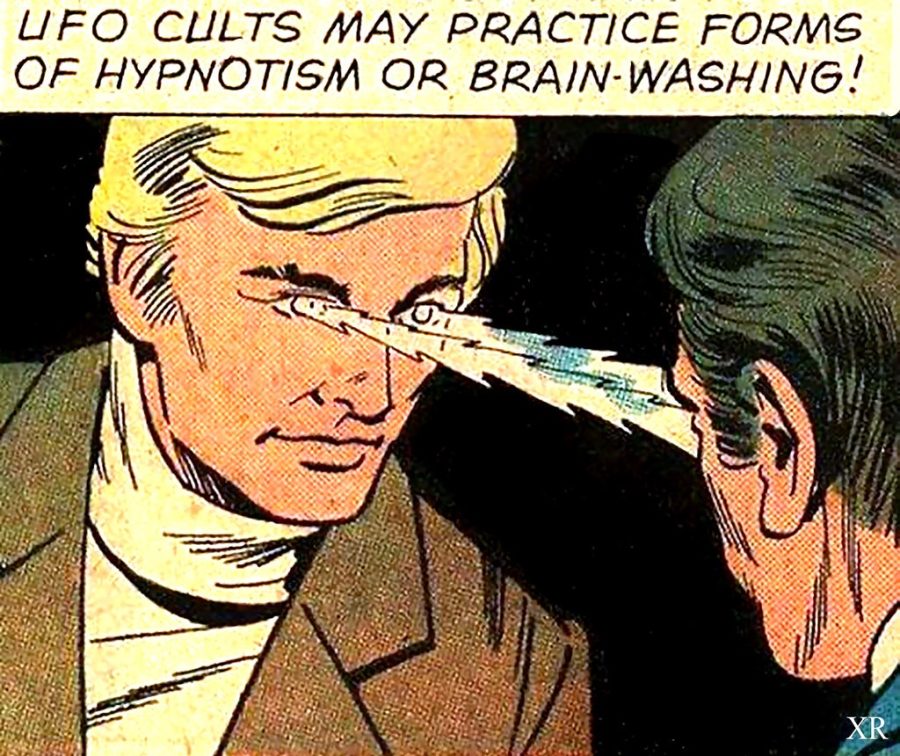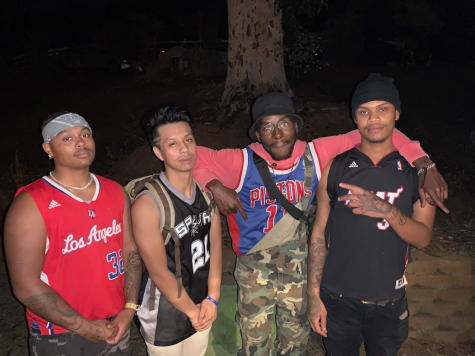7 Signs You Might Have Joined a Cult
Hey, humans of the young adult age; bad news. There’s a good chance many of us might end up in a cult.
Now I know, I know, you’re an educated, intelligent intellectual and know you would never wind up in a cult.
But name another group of humans who are as depressed, hopeless, lost, mentally ill, angry, upset, lonely, and desperate for a reason to live.
That’s right. It’s largely young adults: the generations whose lives were kicked off by 9/11, a financial crisis that never really ended, who grew up watching technology take over, went to school with the constant thought that one of our classmates might shoot us today, got lost in the abyss of capitalism working terrible jobs for a paycheck that won’t even cover a quarter of an apartment’s rent, are trying to start our lives in the middle of a pandemic, watched the American government system fail time after time after time, watched the justice system fail and fail and fail and fail –
Should I go on?
That’s us. That’s our legacy.
We’re angry or we’re sad, and most of us are probably some combination of both. If we’re not one of those two, then we’re tired. We’re exhausted and depressed and have given up hope because the world keeps on spinning and we keep killing each other and hating each other and destroying humankind, all while trying to enjoy the “best years of our lives” and “stay positive.”
Oh, and we’re living through a pandemic, too.
Seeing our grandparents and friends could literally kill them.
That’s not traumatizing at all.
Anyways. Life goes on.
All of these factors and so, so many more set the stage for a whole population of young people who are depressed, upset, angry, lost, tired, and want to find their way in the world. We want to change the world; we want to escape and convince ourselves the world is a little better than it really is.
We want to find happiness, we want to find peace and community and feel like we belong somewhere. Like we’re needed somewhere.
Cults, in the most basic, unfortunate form, provide all of that.
Peace, tranquility, community, purpose, direction.
Don’t fall for it.
A cult, as defined by the International Cultic Studies Association, is “an ideological organization held together by charismatic relationships and demanding total commitment.”
It is worth noting, however, that the term “cult” has been so widely used in society that it could now refer to any number of groups, from sports clubs to businesses, that most scholars today use the term “new religious movements” or NRMs to describe groups with cultic tendencies.
Naturally, the topic of cults, religious movements, and other related themes could fill hundreds of pages and still not cover all the nuance of the topic. This article is intended to be a quick and easy guide, providing the most basic red flags to look out for as we navigate through life. Further resources and research will be linked below.
Anyone is at risk of finding themselves in a cultic relationship, whether that be in a religion, club, team, relationship, or even a business. The phenomenon of the “cult of the founder” is something that has become more and more frequent as small businesses and start-ups gain traction, with businesses like Adam Neumann’s WeWork or other founders, politicians, or celebrity leaders placed on pedestals.
Dr. David Lane, a philosophy professor at Mt. San Antonio College and author of the book Exposing Cults, added that “any ideology or doctrine or figure can be a source of danger if the adherent doesn’t allow for questioning or doubting of the leader or the system of thought.”
With cultic relationships, tendencies, NRMs, and other dangerous groupthink trends having the potential to surround us from home to school to work, it is critical that we be constantly thinking critically about the situations we find ourselves in.
Anyone is subject to these relationships or movements — especially when the leader is good at what they do. But our generation especially should heed the warning, since so little of the world we’re entering as adults retains the fulfillment, purpose, and community most people search for in life.
“Since younger people tend to be more open in their quests for great knowledge and understanding,” Lane said, “they may (on average) be more inclined and more curious to seek out such alternative religions.”
The sugarcoated dangers of a cult or NRM can easily be mistaken for exactly what you’re looking for.
“The most likely candidates for those joining any new religious movements are those who feel that something is missing in their lives,” Dr. Lane said. “I personally think it comes down to a perception of feeling that something is missing or lacking in one’s life and that the new religion may address that core need.”
However, he added, “It depends on their own life circumstance. No hard and fast rules can be made here, since anyone at any time may opt to seek out alternative solutions to their own existential questions or dread.”
The phrase “desperate times call for desperate measures” holds true, and unfortunately, we’re living in an extremely desperate time. Dr. Lane spoke of his time working in a health store, and how that experience led him to realize that the customers who came into the store were people with ailments and illnesses, who came to the health store searching for a remedy.
“Likewise, whenever we are depressed and want a solution, we seek out remedies,” Dr. Lane said. “Whether it is going to a medical doctor for prescription drugs or a Tony Robbins seminar or an alternative religion that offers distinctive solutions.”
While so much of the world around us seems drab and hopeless, it’s easy to see how desperate searches for meaning, purpose, peace, and belonging can lead people to form or join groups of this kind.
However, it is crucial to remain diligent in critical thinking as we search for those things.
“Be doubtful, be skeptical, and be sure to remember that any system, any leader, any ism, can be (and usually is too often) potentially wrong,” Dr. Lane advises. “Any leader or group that cannot be open to criticism is one to avoid.”
Beyond that, here are seven signs that you might be in a cult or cultic relationship, compiled and summarized from research and numerous resources linked below for reference.
- Leadership discourages, ignores, or punishes questioning.
- Leadership encourages self-policing, including confession of and self-punishment for private thoughts, and tattling on other members.
- Leadership in any capacity dictates what thoughts, feelings, and actions you should have or do.
- This includes requiring or encouraging asking permission from the group, information control, group confession, guilt-tripping, and fear in many aspects, to name a few.
4. You can’t leave the group without fear of social, physical, or mental threats of danger or punishment.
- Eg. you’ll be shunned or targeted by the group, you’ve been told that you’ll lose your “salvation,” you’re walking away from God or another higher power, you’ve been seduced by sin/other powers, blackmail, instilled phobias about the outside world, etc.
5. Life beyond the group is discouraged.
- This includes required or encouraged cutting of ties with outside family and friends, jobs, and other social engagements, as well as a required time commitment that dominates most or all of your time.
6. Group think.
- This is one you should look out for in work environments, clubs, and any other social group. If thinking and decision making is preferred to be done as a group over an individual decision, take a very careful look at the group and proceed carefully. This includes group confessions, group permission for individual life decisions, encouraged interaction with only other group members, and guilting individuals for having interactions or lives outside of the group.
7. A leader or leaders have stepped up claiming to be exalted, speaking with a higher power, or any other transcendental proclamation.
- Alongside this is the leader(s) that is not held accountable to any authority. Most leadership positions are accountable to some form of higher authority, such as military commanders, priests, ministers, and coaches, so if your leader has no board or any other kind of authority over them, chances are you’re headed towards cult or NRM status.
Cult experts have used the terms “mind control,” “thought reform,” “destructive mind control,” and “brainwashing” to describe what happens in cults, cultic relationships, NRMs, and other destructive social groups. All seven of these signs and many, many more fall under those terms.
To combat these attempts as us depressed, lost little people make our way through this mad world, remember the acronym BITE, as coined by cult expert Steven Hassan.
BITE stands for Behavior, Information, Thought and Emotion control.
The BITE model puts the assumed mystical, fictional process of mind control into shockingly real actions that each of us can look out for in our everyday lives.
Behavior control includes everything from dress codes to scheduling and time commitments, to a punishment-and-reward system, groupthink over individual decisions, and a need for permission from one or more leaders or members. Behavior control is just that: any exertion of control over your behavior.
Information control entails both withholding information and proliferation of censored information. This also includes anything that encourages spying on other members, tattling, and self policing. Also included in this section is confession, or anything to do with “sins,” as defined by the group, which can easily be used to manipulate or guilt someone. Sins, confession, and this idea of wrong vs. right within the group also abolishes the sense of privacy individuals usually have, creating more dependency and “loyalty” to the cult.
Thought control is most easily recognized by the discouragement of questioning authority. If leaders are preaching a group doctrine as truth and have little to no respect for questions or other possible schools of thought, that’s a good sign that thoughts are being manipulated. This also includes thought-stopping, or a rejection of critical analysis and guilt for thoughts and doubts, all creating this internal self-policing of your own thoughts. You’re not thinking for yourself anymore.
Emotion control is characterized by two main emotions: guilt and fear. Those can come sugar coated, too. This includes blaming doubts and problems on the individual, never the group or leader, extreme emotional highs and extreme emotional lows, as well as an indoctrinated fear of the outside world.
If you find yourself afraid to rejoin the outside world for fear of being shunned by the group, losing your “salvation,” or being told you’ve been brainwashed and seduced by the sins of the outside world convincing you to leave…chances are you’ve joined a cult.
Once again, this article does not cover nor attempt to cover all the nuance involved in cult/NRM studies, nor even all the signs that a group has become a cult or new religious movement. Since nearly anything can be considered a cult by certain definitions, from the Catholic church to a sports team to a fandom, the most important resource to be found is your own critical thinking.
Keep your brain on. Question everything. Research and reference these resources if you are concerned.
And please, have faith that you will find what you are looking for. Steel is forged in fire, and after every metaphorical fire our generation has been through within the first couple decades of our lives…
I think we’ve become built to withstand any battle.
Resources and further research:
A loaded masterpost with links, definitions, and resources on cults and NRMs
Counseling resources from the International Cultic Studies Association
The Freedom of Mind Resource Center










